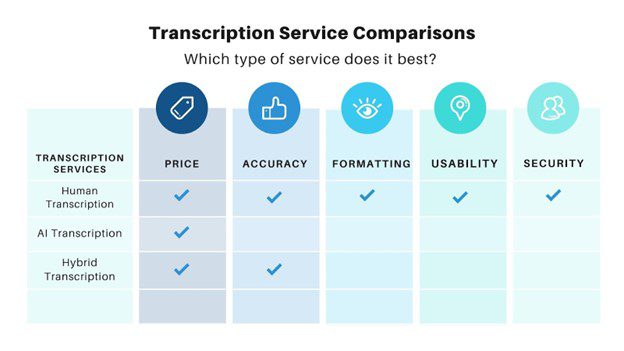Find out what human transcription services can do for your business and how they might help improve the way you handle various tasks.

Machines can achieve some pretty incredible things these days. They can drive cars, beat humans at games like chess, and even perform surgeries. But there’s just no substitute for the human touch when it comes to transcription.
So, if you’re considering using a transcription service for your business, be sure to read this post from top to bottom so you can learn about the unbeatable benefits of human transcription services.
What Are Human Transcription Services?
A human transcription service is just what it sounds like—a service that provides transcripts of audio or video files that are produced by real people, not machines. Once you upload your audio file to the transcription service platform, it will be assigned to a real person who will then transcribe the audio into a professionally formatted, ready-to-use file.
There are several advantages of using human-generated transcription services over AI transcription, which we’ll explore in more detail below.
What Are the Three Types of Transcription Services?
Edited Transcription
This type of transcription service is perfect for when you need a clean, polished final product that’s ready to be published or distributed. The transcriber will listen to the audio file and create a transcript before editing for grammar, spelling, and punctuation.
Verbatim Transcription
A verbatim transcription service is helpful when you need an exact word-for-word account of what was said in the audio file. The transcriber will listen to the audio file and create a transcript, which includes everything from “ums” and “ahhs” to false starts and filler words.
Intelligent Transcription
Intelligent transcription is an excellent middle ground between edited and verbatim transcription. The transcriber will listen to the audio file and create a transcript, which is then lightly edited to reflect contextual changes, such as when someone misspeaks or pauses in the middle of a sentence.
Human-Generated Transcription Services vs. AI Transcription: What's the Difference?
There’s no doubt about it—artificial intelligence (AI) speech recognition services are on the rise. However, no matter how advanced technology seems, there’s one thing that machines will never be able to do as well as humans—understand the context.
Context is a crucial element in transcription, as even the smallest nuances can change the meaning of what is said. As such, a human transcription service will always be superior to AI when it comes to accuracy and quality.

10 Unbeatable Reasons to Use Human Transcription Services Instead of Automated Transcription
Do you have video or audio files that need to be transcribed? Then here are ten unbeatable reasons to use human transcriptionists instead of automated transcription.
1. Human typists actually listen to your formatting directions.
When you’re using an automated service, you have to rely on the software to correctly format your transcript according to your instructions.
In that case, prepare to be sorely disappointed.
Unfortunately, directions like “scratch that” or “new bullet point” get lumped in with the text rather than interpreted as instructions for formatting.
With a human transcription service, you get the benefit of easy-to-read and specialized formatting. The transcriptionist will follow your formatting instructions to the letter, ensuring that you get a transcript that’s ready to use in any legal or professional setting.
2. Human transcription offers you better value at an affordable rate.
In this industry, automated transcription services are notorious for producing low-quality, inaccurate transcripts that must be heavily edited before you can use them. But with human transcriptionists, you get a lot more bang for your buck.
Considering that the pricing is generally the same (and in some cases, human transcription services are even more affordable), there’s really no financial advantage to using an AI transcription service.
3. The accuracy of manual transcription by humans is, hands down—the best (especially if you’re a professional).
For legal professionals, this is probably the most important reason to use a human typist. Automated software has come a long way in recent years, but it’s still not as accurate or reliable as human transcription. Human transcriptionists consistently deliver 99% accuracy, while AI transcription averages between 70-80% accuracy.
And when it comes to accuracy, even the slightest mistake can have enormous consequences for your clients. With human transcription services, you can be confident that what’s in the transcript accurately represents what was said in the video or audio file—no guessing or hoping that the software got it right.
4. Human-generated transcription services can handle background noise.
One of the most common complaints about automated transcription software is that it can’t handle background noise very well. That’s a big problem if you’re transcribing audio or video files recorded in a noisy environment, such as a crowded restaurant, a busy office, or a space with poor acoustics.
Human transcriptionists don’t have this problem—the transcriber will be able to filter out the background noise and focus on the speech, ensuring that the transcript is accurate.
5. You don’t have to worry about accents or dialects affecting accuracy.
Audio or video files recorded with regional accents or dialects are a no-go for AI transcription. Most transcription software is programmed to recognize standard American English, so anything that requires a trained ear will likely be transcribed inaccurately.
On the other hand, human transcriptionists are experienced in transcribing all accents and dialects. So whether you’re dealing with a heavy Southern drawl or a non-native English speaker, you can rest assured that the transcript will be accurate.
6. Human transcriptionists can differentiate between multiple speakers.
If you’re transcribing a video or audio file with multiple speakers, AI software might have a hard time differentiating between them. This can lead to confusion and inaccuracies in the transcript—not ideal if you’re trying to produce a professional document.
With human-generated transcription services, you don’t have to sweat any confusion, as the transcriber will be able to differentiate between multiple speakers with ease.
7. You can rest easy knowing human transcriptionists respect privacy, protect your data, and comply with HIPAA standards.
When you’re using an AI service, you have to entrust your sensitive data to the software. The data is stored on servers indefinitely, leaving it vulnerable to hacking, data leaks, and other security breaches—quite problematic if you’re transcribing audio or video files that contain confidential information.
When you leave your audio files to humans, you can rest easy knowing that your data is in good hands. Human transcribers keep all data confidential and can comply with strict HIPAA regulations.
8. Humans understand how to tell the difference between there, their, and they’re (and other common homophones).
It might seem like a small detail, but it’s actually a big deal. Automated transcription software often has trouble differentiating between homophones (words that are pronounced the same but have different meanings), which can lead to errors in the transcript.
For example, you wouldn’t want your transcript to change something like “my client didn’t meet the defendant” to “my client didn’t meat the defendant.” Although that would be a hilarious mistake, it’s not exactly professional!
It all comes down to context—human transcribers will be able to tell the difference between homophones, ensuring that the transcript is more accurate.
9. Believe it or not, human typists offer speedy turnaround (again—with better accuracy than AI transcription).
One of the biggest misconceptions about human transcription services is that they’re slow. In reality, most human transcriptionists can type at least 60 words per minute, meaning they can transcribe an audio or video file in as little as two or three hours.
And while AI transcription might be able to transcribe files faster, accuracy is often sacrificed in the process. So if you’re looking for speed and accuracy, human transcriptionists are the way to go.
10. Professional human transcription needs little to no editing after delivery—saving you time (and embarrassment).
What’s the point of hiring an audio transcription service if you have to spend hours making corrections to grammar, spelling, and formatting? When you’re a busy professional, the last thing you want to do is waste precious time editing a transcript.
Fortunately, if you use professional human transcription services, you won’t have this problem. Transcripts are hassle-free and delivered in a polished, professional format that requires little to no editing, even for Spanish audio transcription.
Frequently Asked Questions About Transcription Services
How long does it take to get your transcription file?
The length of the file will determine the turnaround time. For example, the average human typist can type 60 words per minute, so a one-hour audio or video recording will take approximately two hours to transcribe.
Who uses transcription services?
There are several reasons why you might need transcription services. Professionals such as lawyers, insurance adjusters, police officers, and mediators may need legal transcription of interviews or court proceedings. Academics may need lectures and class discussions transcribed for research purposes. Businesses might use transcription services to create meeting minutes or to record customer service calls.
Why does AI transcription struggle to understand audio files?
The problem is that automated transcription software relies on algorithms to transcribe audio files. Unfortunately, these algorithms are not as accurate as human transcriptionists, and they often have difficulty understanding accents, differentiating between homophones, and picking up on context clues.
If you’re using a transcription service for personal reasons, these little errors might be acceptable, but professionals need transcription services that they can rely on.
When should I use human-generated transcription services over AI transcription services?
If you’re looking for fast, accurate transcription, human typists have you covered. Sure, AI transcription might be faster, but the errors simply aren’t worth it.
You’ll spend any amount of time you might save making corrections. And in the end, you might even end up spending more money on an AI transcription service than you would have on a human typist.
How do I know if my data is confidential?
If you’re worried about the confidentiality of your data, a human transcription service is the way to go—all data is treated confidentially and is never used for purposes other than creating the transcription. Most services can provide detailed information around the security measures used to store and transmit files, as well as when and how old files are destroyed.
The Bottom Line
Human transcription services offer so many advantages over automated transcription software that it’s really a no-brainer. From better accuracy and formatting to increased security and speed, human transcriptionists provide a level of quality and service that you just can’t get from an AI transcription service.
SpeakWrite is a 100% human transcription service that can take care of all your transcription needs in a timely, accurate, and affordable manner. You can rest assured that we’ll complete your transcription quickly and accurately. Plus, our competitive pricing makes us an affordable option for any budget.
Learn more about how SpeakWrite’s best human transcription services can save you time and money today.
